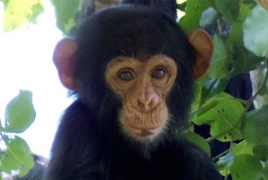Chimpanzee beds are cleaner than those of humans, study finds May 23, 2018 - 12:43 AMT PanARMENIAN.Net - Who knew that our closest animal relatives, the great apes — specifically chimpanzees — keep tidier bedrooms than humans do? A group of researchers in Tanzania wanted to find out what kinds of bugs and bacteria lurk in chimps' treetop nests, and how those compare to the ones found in our own beds, CBC.ca reports. "We know that human homes are effectively their own ecosystems," said Megan Thoemmes, a PhD student at North Carolina State University and lead author of a study on this research. For example, over one third of all bacteria in our beds come from our own bodies, which includes fecal, oral and skin bacteria, said Thoemmes. To do their works in the tropical forests of Tanzania, the researchers waited each day for the chimps to vacate their premises. Unlike humans, who sleep in the same bed over and over again, chimpanzees and other great apes build new nests every single night. By the morning they're on the move again and set up camp elsewhere. So when the coast was clear each day, the small group of researchers would climb the trees to collect their samples using cotton swabs and a handheld insect vacuum. This work went on between August 2013 and April 2014. The researchers collected swabs from 41 beds. In 15 of those beds, researchers also vacuumed the inside of the nest and the ground directly below, to collect arthropod specimens — things like insects, mites, ticks or spiders. "We were anticipating to find quite a number of ectoparasites (fleas) within chimpanzee beds," says Thoemmes. "But we found almost none, which was really surprising." Surprising indeed, given that chimps play host to more than 60 parasites. But the clean beds are probably explained — at least in part — by chimps' great grooming skills. They pick bugs from their fur, and the fur of other chimps, then snack on them. Thoemmes and her colleagues also expected to find a large amount of microbes from the chimps' bodies, things like bacteria from the skin, saliva and feces. But again, the researchers found almost none. Primatologist Adriana Hernandez-Aguilar, one of the team of researchers sucking up the dirt in Tanzania, offered an explanation for the lack of fecal matter. "Chimpanzees are very peculiar because they never defecate in the nest," she told CBC News from Barcelona. "Like many of us, they poo in the morning." When nature calls, chimps display some pretty impressive toilet hygiene, handy skills that prevent them from soiling their nests. Photo. Ed Mclester Authorities said a total of 192 Azerbaijani troops were killed and 511 were wounded during Azerbaijan’s offensive. In 2023, the Azerbaijani government will increase the country’s defense budget by more than 1.1 billion manats ($650 million). The bill, published on Monday, is designed to "eliminate the shortcomings of an unreasonably broad interpretation of the key concept of "compatriot". The earthquake caused a temporary blackout, damaged many buildings and closed a number of rural roads. Partner news |